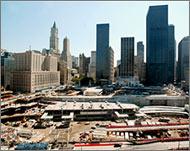Bushwacked! Asia remembers 9/11
On the second anniversary of the September 11 attacks, Australians remembered loved ones and US embassies across Asia lit candles, but the media criticised the Bush administration’s war-mongering policy.

In the Australian city of Sydney, environmental group Planet Ark joined Americans and US diplomats to plant 3000 native trees in memory of those killed when hijackers flew airliners into the World Trade Center, the Pentagon and a field in Pennsylvania.
Amid this, repeated throughout Asia, was the emergence of a new videotape showing al-Qaida leader Usama bin Ladin praising those strikes.
“The attacks on the US did indeed rouse the ‘mighty giant’ Mr Bush spoke of at the time,” said Hong Kong’s South China Morning Post in an editorial.
Stoking hatred
“But the world’s only remaining superpower must realise that the ‘with us, or against us’ approach, and in particular the further use of aggression, will only fuel the hatred which motivated the attacks in the first place.” It said.
These were sentiments echoed around the region – from the world’s most populous Muslim nation, Indonesia, to former US foe and now trading partner, Vietnam. They served as a reminder of US military actions that have divided the world in the past two years.
In Hong Kong, the US consulate lowered the flag to half-mast.
In Tokyo, yellow-robed Buddhist monks led a group of 20 people to pray for peace outside the US embassy and protest against the invasion of Iraq.
 |
|
Where the World Trade Centre once |
“When the terrorism occurred, I think people all over the world sympathised with the US. But I think the US has lost its power with its acts over the following two years,” said Yogo Nomoto, a 37-year-old local government worker.
“I think what is being asked of President Bush is to stop the fighting in Iraq immediately,” said Takao Takeda, a monk who organised the protest as the group banged small wooden drums and displayed a banner reading: “No More War! Non
Violence!”.
“This war against terrorism is likely to go on for years and nobody can regard themselves as beyond the reach of terrorism,” said Australian Prime Minister John Howard, a close ally of Bush.
But Howard’s view was questioned by newspapers – and the public – across Asia.
Outspoken criticism
“I still feel for the American victims. The United States has since become more aggressive, but that’s due partly to September 11,” said Hong Kong trader Ashley Wong.
Editorials were more outspoken about the fallout from the US response that has now drawn its army into quagmires in Iraq and Afghanistan and failed to net bin Ladin, the suspected September 11 mastermind.
“Two years after September 11 … America instead goes towards a path of self-isolation and being unilateral in action,” said an editorial in Vietnam’s People’s Army newspaper.
|
“Two years after September 11 … America instead goes towards a path of self-isolation and being unilateral in action” People’s Army Newspaper, |
Australia’s Sydney Morning Herald was more outspoken. “The goodwill of America’s allies has been squandered,” it wrote. “The threat represented by the terrible attacks of two years ago remains.”
In Indonesia, site of the world’s worst post-September 11 attacks when bombs killed 202 in Bali nightclubs last October, the Jakarta Post took a similar tone.
“There is also the fear that, unless it is carefully managed, the war against terrorism is likely to be perceived in the Islamic world as a crusade against them,” it said.
“But, so far, President Bush is not only far from rooting out terrorist networks and getting to the core of the problem; he has triggered the emergence of more terrorists in the world,” the Post said.